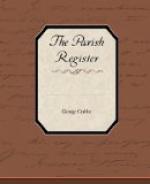Who play’d uninjured with the dangerous flame;
That, while, like Lovelace, thou thy coat display’d,
And hid the snare for her affection laid,
Thee, with her net, she found the means to catch,
And at the amorous see-saw won the match:
Yet others tell, the Captain fix’d thy doubt;
He’d call thee brother, or he’d call thee out: —
But rest the motive—all retreat too late,
Joy like thy bride’s should on thy brow have sate;
The deed had then appear’d thine own intent,
A glorious day, by gracious fortune sent,
In each revolving year to be in triumph spent.
Then in few weeks that cloudy brow had been
Without a wonder or a whisper seen;
And none had been so weak as to inquire,
“Why pouts my Lady?” or “Why frowns the Squire?”
How fair these names, how much unlike they look
To all the blurr’d subscriptions in my book:
The bridegroom’s letters stand in row above,
Tapering yet stout, like pine-trees in his grove;
While free and fine the bride’s appear below,
As light and slender as her jasmines grow.
Mark now in what confusion stoop or stand
The crooked scrawls of many a clownish hand;
Now out, now in, they droop, they fall, they rise,
Like raw recruits drawn forth for exercise;
Ere yet reform’d and modelled by the drill,
The free-born legs stand striding as they will.
Much have I tried to guide the fist along,
But still the blunderers placed their blottings wrong:
Behold these marks uncouth! how strange that men
Who guide the plough should fail to guide the pen:
For half a mile the furrows even lie;
For half an inch the letters stand awry; —
Our peasants, strong and sturdy in the field,
Cannot these arms of idle students wield:
Like them, in feudal days, their valiant lords
Resign’d the pen and grasp’d their conqu’ring swords;
They to robed clerks and poor dependent men
Left the light duties of the peaceful pen;
Nor to their ladies wrote, but sought to prove,
By deeds of death, their hearts were fill’d with love.
But yet, small arts have charms for female eyes;
Our rustic nymphs the beau and scholar prize;
Unletter’d swains and ploughmen coarse they slight,
For those who dress, and amorous scrolls indite.
For Lucy Collins happier days had been,
Had Footman Daniel scorn’d his native green,
Or when he came an idle coxcomb down,
Had he his love reserved for lass in town;
To Stephen Hill she then had pledged her truth, —
A sturdy, sober, kind, unpolish’d youth:
But from the day, that fatal day she spied
The pride of Daniel, Daniel was her pride.
In all concerns was Stephen just and true;
But coarse his doublet was and patch’d in view,
And felt his stockings were, and blacker than his shoe;
While Daniel’s linen all was fine and fair, —
His master wore it, and he deign’d to wear:
(To wear his livery, some respect might prove;
That, while, like Lovelace, thou thy coat display’d,
And hid the snare for her affection laid,
Thee, with her net, she found the means to catch,
And at the amorous see-saw won the match:
Yet others tell, the Captain fix’d thy doubt;
He’d call thee brother, or he’d call thee out: —
But rest the motive—all retreat too late,
Joy like thy bride’s should on thy brow have sate;
The deed had then appear’d thine own intent,
A glorious day, by gracious fortune sent,
In each revolving year to be in triumph spent.
Then in few weeks that cloudy brow had been
Without a wonder or a whisper seen;
And none had been so weak as to inquire,
“Why pouts my Lady?” or “Why frowns the Squire?”
How fair these names, how much unlike they look
To all the blurr’d subscriptions in my book:
The bridegroom’s letters stand in row above,
Tapering yet stout, like pine-trees in his grove;
While free and fine the bride’s appear below,
As light and slender as her jasmines grow.
Mark now in what confusion stoop or stand
The crooked scrawls of many a clownish hand;
Now out, now in, they droop, they fall, they rise,
Like raw recruits drawn forth for exercise;
Ere yet reform’d and modelled by the drill,
The free-born legs stand striding as they will.
Much have I tried to guide the fist along,
But still the blunderers placed their blottings wrong:
Behold these marks uncouth! how strange that men
Who guide the plough should fail to guide the pen:
For half a mile the furrows even lie;
For half an inch the letters stand awry; —
Our peasants, strong and sturdy in the field,
Cannot these arms of idle students wield:
Like them, in feudal days, their valiant lords
Resign’d the pen and grasp’d their conqu’ring swords;
They to robed clerks and poor dependent men
Left the light duties of the peaceful pen;
Nor to their ladies wrote, but sought to prove,
By deeds of death, their hearts were fill’d with love.
But yet, small arts have charms for female eyes;
Our rustic nymphs the beau and scholar prize;
Unletter’d swains and ploughmen coarse they slight,
For those who dress, and amorous scrolls indite.
For Lucy Collins happier days had been,
Had Footman Daniel scorn’d his native green,
Or when he came an idle coxcomb down,
Had he his love reserved for lass in town;
To Stephen Hill she then had pledged her truth, —
A sturdy, sober, kind, unpolish’d youth:
But from the day, that fatal day she spied
The pride of Daniel, Daniel was her pride.
In all concerns was Stephen just and true;
But coarse his doublet was and patch’d in view,
And felt his stockings were, and blacker than his shoe;
While Daniel’s linen all was fine and fair, —
His master wore it, and he deign’d to wear:
(To wear his livery, some respect might prove;




